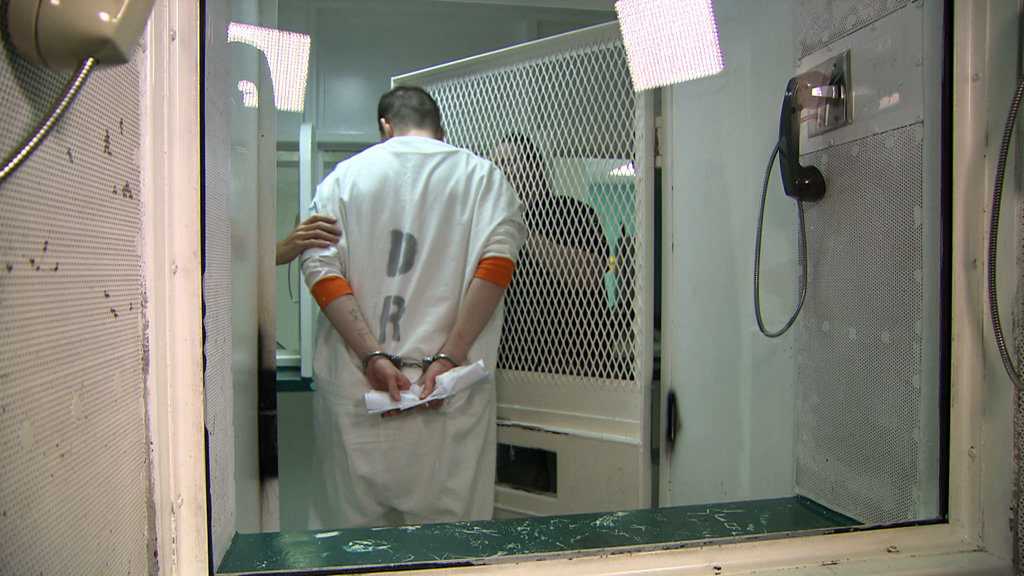Yesterday evening I finished watching Werner Herzog‘s 2011 documentary Into the Abyss. The story behind the movie is very simple, one a spree of crimes committed by two young men — really, boys. From the New York Times’s review:
In October 2001, in Conroe, Tex., Sandra Stotler, her son Adam and his friend Jeremy Richardson were murdered, apparently because the killers wanted the red Camaro in Ms. Stotler’s garage. About a week later, after a shootout in a shopping center parking lot, two young men were arrested in the case. One, Jason Burkett, received a life sentence. The other, Michael Perry, was sentenced to death.
The bulk of the movie consists of people being very gently interviewed by Herzog: the bereaved survivors of the victims, detached, professional lawmen, the imprisoned perpetrators and people connected with them. For people looking to feel bad about and for humanity there’s abundant material to chew over here. It’s heartbreaking to watch a woman like Lisa Stolter-Balloun talk about what it’s like to try to live her life after her mother and brother were killed or to watch a would-be tough guy like Charles Richardson gazing at the framed picture of his dead baby brother and struggle not to cry on camera. And it’s downright disturbing — and perhaps a little nausea-inducing — to watch Michael Perry trying to face down the existential anxiety of imminent execution with a parade of smiling clichés of religious and therapeutic uplift. One can tell that he’s not quite persuaded by his own story.

Michael Perry being led away from his interview with Werner Herzog. Eight days later, Perry was put to death by lethal injection.
What was really raw, though, was watching the interview of Delbert Burkett, the father of Jason Burkett and himself likely to spend the rest of his life in prison. The elder Burkett blames himself for the dark course his son’s life took. He reflects on what he should have done as a father that he didn’t do: if only I had taken my boys to play baseball, if only I had had them raise a steer like I did when I was a boy, if only I had been there to really teach them right from wrong. When Herzog asks Burkett where the really bad choice was made, Burkett remembers that he had a football scholarship to the University of Texas, but he gave that up, dropped out of high school and football and started to do drugs instead, a choice which led him down a path to a life of crime and imprisonment. How could I not have been riveted at that moment, given my own morbid fascination with life-counterfactuals? If you ever want to see a portrait of a man being eaten alive by his own sense of remorse you can watch this but be warned: it is not easy viewing.
Amidst all the suffering there is an odd twist ending. Jason Burkett ends up being married in prison to a generous, pretty young woman named Melyssa whom he meets through correspondence. (I must wonder: do “normal” men have so little to offer these days that an attractive woman like Melyssa prefers to court and marry a convicted murderer, a man incarcerated in a maximum security prison who will not even be eligible for parole until sometime in the 2040s? Answer: probably yes.) Melyssa has made — so it is strongly implied — a very curious arrangement under which some of Jason’s semen has been smuggled out of prison to inseminate her. She is in an advanced stage of pregnancy by the time Herzog interviews her, and she holds up an ultrasound picture of her yet-to-be-born son on her smartphone for the viewers to see. “You can see he gets his strong chin from me,” she says with evident adoration.
I would imagine that 99 of 100 of Herzog’s viewers will be feeling a warm glow of moral satisfaction at this point. After all this suffering, a happy ending of sorts. Against the claustrophobic images of Texas’s death chamber shown only minutes before, an image of hope and new life. All’s right with the world, after all. This might even be Herzog’s own reading of his documentary. It is the surface that everyone sees, thus the exoteric reading.
And yet I cannot avoid a different reading, because I haven’t forgotten Delbert Burkett and his own lifetime of regret. Given the world as it is, the suffering we have seen, the knowledge that terrible things happen to people like they have happened to most of the interviewees in this movie, given the knowledge that people will almost inevitably make bad choices, how can we justify bringing the innocent child shown on Melyssa Burkett’s smartphone screen into the world. Even the suffering is not a certainty, it is surely a risk. How can we justify materializing the risk.
Perhaps it would be best if I treated my reading of the movie as an esoteric one. I’m sure it’s one that’s upsetting for most people. But I’ve always had a problem staying away from keyboards.
